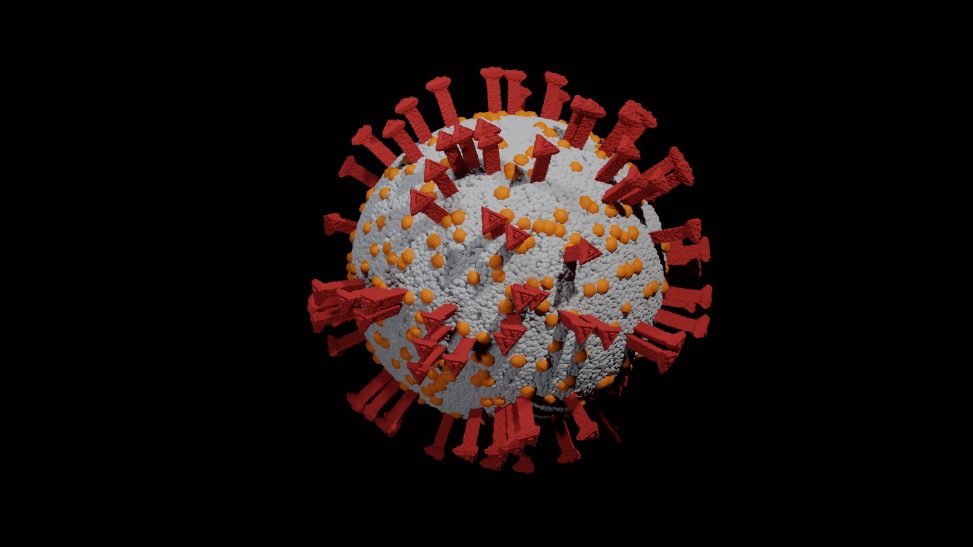In a new computational study by the Dutch publishing and analytics company Elsevier, analysts made use of computerized models and international COVID-19 data to determine that there is a correlation between severity of COVID-19 symptoms in infected individuals and their genetic data that controls the creation of the angiotensin-converting enzyme 1 (ACE1). This study has proven that the individuals who have a deletion in their ACE1 enzyme coding gene have a lower prevalence of COVID-19 infection and COVID-19 related death.
This discovery explains why some individuals show more severe and increased symptoms of COIVD-19 than others.

Image form Sarah via Flickr. Labrador coat variety is an example of a polymorphism
This kind of genetic variation is known as a polymorphism. A polymorphism occurs when a gene can exist in more than one form in a population. An example of a polymorphism can be human eye color or the color of a dog’s coat. A deletion occurs when a specific part of a gene is not present in the genetic material being viewed. This study looked at how a deletion in the gene that codes for the ACE1 enzyme correlated with the effect of COVID-19 on humans.
To test this correlation, the analysts took genetic information from residents of 25 different European countries and matched it with COVID-19 prevalence and mortality data that was calculated by Johns Hopkins. Along with the ACE1 enzyme, the analysts tested the variability in the genes of several other immune-related human proteins to see if there was a correlation with the effects of COVID-19.
The analysts found that 38% of the variability in COVID-19 effects in the tested population can be explained by the prevalence of the ACE1 enzyme deletion. In addition to this, the analysts found that a significant correlation could also be noted between COVID-19 caused mortality and the prevalence of the ACE1 enzyme deletion. The analysts claimed that their model improved once the onset of the epidemic in each nation was considered. They also noted that China and South Korea, the two countries in Asia that were severely hit at the start of the COVID-19 epidemic, also had low ACE1 enzyme deletion frequencies in their populations.
The discovery that the ACE1 enzyme plays a role in lung infections caused by COVID-19 lines up with what is already known about ACE enzymes and coronaviruses. ACE2 (another form of the ACE enzyme) is known to allow the invasion of the SARS virus (another coronavirus) into the body. Coronaviruses bind to their targets in our bodies by utilizing the ACE2 enzyme. This causes a decrease in ACE2 levels in the body resulting in more lung tissue damage. The ACE1 enzyme functions by converting the hormone angiotensin into the active hormone vasoconstrictor angiotensin. This hormone causes our blood vessels to contract resulting in an increase in blood pressure.
The analysts say that further studies are required to see the clinical outcome of COVID-19 infection in test subjects that carry different genetic varieties of the ACE enzyme to understand how its polymorphism effects therapy response to COVID-19. Additionally, they claim that this polymorphism will need to be included in mathematical models that describe the COVID-19 epidemics so that accuracy of the models can be improved.
Elsevier is one of the publishers that is on the front line of the fight against COVID-19. They had recently established a COVID-19 Healthcare Hub that provides free access to expert insights, research resources, and guidelines to healthcare professionals. In addition to this, Elsevier is partnering with other analytical firms to develop personalized model simulations that will improve the dosing of COVID-19 related therapies. This is being achieved by providing widely cited literature regarding the 20 drugs that are being tested for COVID-19 therapy.
Source:
Delanghe, J.R., Speeckaert, M.M., De Buyzere, M.L. 2020. The host’s angiotensin-converting enzyme polymorphism may explain epidemiological findings in COVID-19 infections, Clinica Chimica Acta.
Link: https://www.sciencedirect.com/science/article/pii/S0009898120301339?via%3Dihub

Alex
This is such an interesting article, and very relevant!! Great job at explaining the molecular science behind it all like polymorphism. I really enjoyed reading it. I wonder if, because the difference of severity in different people, certain antibodies may be more successful for some more than others – when antibodies are discovered that is!